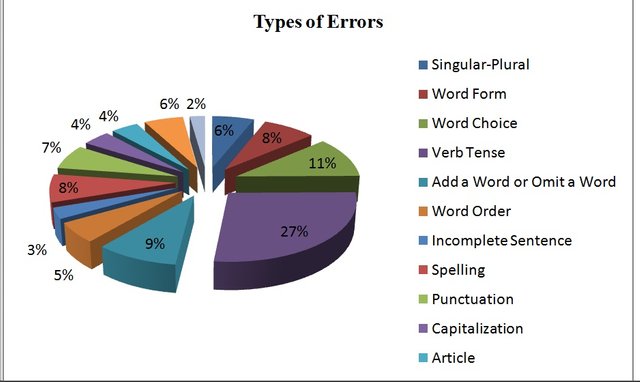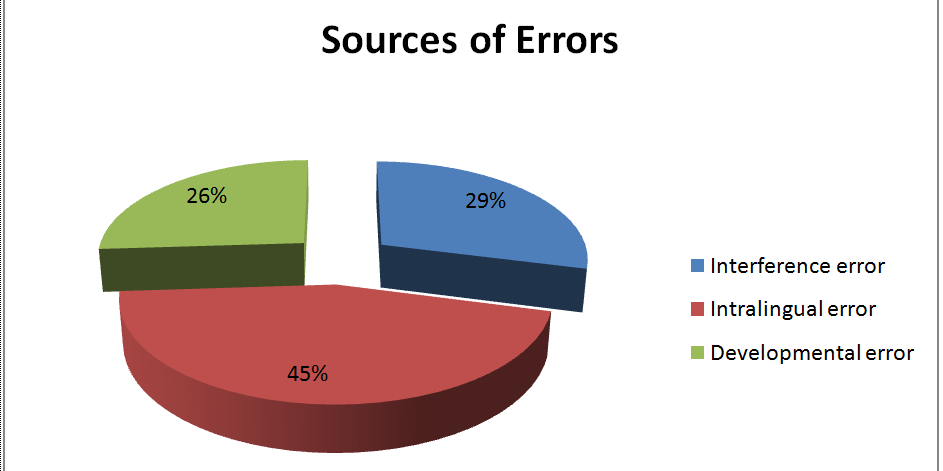The Most Grammatical Errors Made by Students in Writing
A. Introduction
As a productive skill, writing is not like speaking or other receptive skills. Writing skill not only need a lot of vocabulary in composing a paragraph, but also correct grammars, apart from other writing’s rules, in order to be comprehensible. Therefore, composing a paragraph in writing activity takes a lot of times. As Harmer (2004) states that writing and speaking are totally different, in writing students have a lot of times to think about the idea as opposed to what they do in oral activities. Students can think what comes across their minds and consult to dictionaries and book references. But, to express the ideas in process of writing are the most difficult skill to be mastered by students.
In the context of second language (L2) or foreign language (EFL) learning, the difficulty of writing does not only lie in creating and organizing the idea, but also in translating the idea into readable writing. Richard and Renandya (2002) explain that mastering writing skill is the most difficult for L2 learners. Learners have to get involved on higher level skills of planning and organizing as well as lower level skills of spelling, punctuation, word choices and so on. The different elements found between two languages are considered as the main problem. This leads students to make grammatical errors in process of writing because most of students tend to translate their ideas from L1 to L2.
According to Richard (1974) there are three categories of errors. L2 learners often misuse the element of a language when they speak another language. This is what is called interference errors. Also, they make intralingual errors when generalizing characteristic of learning rules, for examples a general plural form of a noun in English is by adding –s or –es as the suffix. Last, L2 learners whose basic knowledge is limited try creating hypothesis of second language they learn. Such an error is what comes to be known as developmental errors. These three sources of errors are frequently made by senior high school students when writing some kinds of text obliged by the curriculum.
There are some problems faced by students in writing recount text. Karani in Marda (2013) says that the grammatical error is the most serious problem made by high school students in writing recount text. It comes up when students apply past tense with regular and irregular verbs. The organization of the text may also cause difficulty to students particularly in composing coherent and cohesive texts. Other problems come up in the part of content, vocabulary and spelling. This happens when students demonstrate to the main ideas, to care of diction and to concern on mechanism and punctuation.
B. Error and Mistake
The first question that come across my mind when I started writing this article is What is different between error and mistake?. At glance, these two words have the same meaning, but in terms of terminology these two words are quite different. Furthermore, it is essential for me to make a distinction between the errors and mistakes to avoid the misunderstanding.
Brown (2000) suggests that distinguishing errors and mistakes can appropriately analyze learners’ L2 learning performance. Mourtaga (2004) points out that errors and mistakes are different from each other because an error cannot be self-corrected and is caused by a learner’s inadequate knowledge of the target language whereas a mistake can be self-corrected. Gas and Selinker (2001) explains that a mistake can be self-centered, but an error refers to systematic errors which often occur in second language learning.
Errors cannot be self-corrected by learners because they occur repeatedly, until further relevant input (implicit or explicit) has been provided and converted into the learners. It means that the learners need further relevant learning about the target language before they can be self-corrected. Norrish (1987) defines the errors as “a systematic deviation” which can be interpreted as the deviation which happens repeatedly. A mistake is also a deviation of norms of languages but is not systematic. It means that a mistake is inconsistent deviation; learners sometimes get right but sometimes wrong. However, according to Yuksel (2007) mistakes are not a result of a deficiency in competence. They can be considered by the slip of tongue, fatigue, carelessness or other aspects of performance both in writing and in speaking.
C. Types of Grammatical Errors
The data of this article is based on my research in 2016 in a private school in Aceh. The number of participant is 20 students of senior highschool. To clarify students’ errors in writing, I employed Betty S. Azar’s classification. This findings of the analysis suggested that the thirteen classifications proposed by Betty S. Azar (1989) were found in the students’ writings. The thirteen types are respectively singular-plural, word form, word choice, verb tense, add or omit a word, word order, incomplete sentence, spelling punctuation, capitalization, article, meaning not clear and run-on sentence.

Chart 1: Grammatical Errors Made by Students in Writing (Alfayed, 2017)
Based on the chart above, we can see that the two most common types of grammatical errors out of those thirteen types in the students recount texts are verb tense and word choice. The first one is found 117 times or 27% of the total errors. The students mostly performed these errors due to the misuse of verbs in the texts. Since the recount text talks about past experience, the students must use past tense in the texts. The following type of error is word choice. This error appeared in 48 times or 11% of the overall number. This kind of error happened when the students used inappropriate words in writing such as collected for gathered, studying for training and focused to for focused on, etc.
Moreover, I also analyzed the sources of errors that they made in writing. The sources of errors means the causes of errors. In this analysis I used Richard’s theory on sources of errors.

Chart 2: Sources of errors made by students in writing (Alfayed, 2017)
Based on the finding of the analysis, the three sources of errors that proposed by Richard (1970) were found in the students’ recount texts; they are Interference Error, Intralingual Error and Developmental Error. Intralingual Error is the majority of source of error in which the students made 197 errors or 45% of the total number. This error deals with the faulty of characteristic of the second language itself, in this case is English. Mostly, the misuse of verb tense or verb tense error is considered as the cause of Intralingual Error.
References
Alfayed, A. (2017). An Analysis of Students’ Grammatical Errors in Writing Recount Texts. Banda Aceh, UIN Ar-raniry.
Azar, B. S. (1989). Understanding and using English grammar (2nd ed.). Englewood Cliffs, New Jersey: Prentice-Hall, Inc.
Brown, C. (1980). Error analysis: a hard look at method in madness. Utah Language Quarterly, 1(3), 14-26. (ERIC Document Reproduction Service No. ED150863).
Gass, S. M., & Selinker, L. (2001). Second language acquisition: an introductory course. Lawrence: Erlbaum.
Harmer, J. (2004). How to teach writing. Harlow. Essex: Pearson Education, Ltd.
Karani, E. (2007). Area of problem in writing recount text. Master’s thesis, Universitas Palangka Raya, Palangka Raya.
Mourtaga, K. R. (2004). Investigating writing problems among Palestinian students: studying English as a foreign language. Bloomington, Indiana: Author House.
Norrish, J. (1987). Language learning and their errors. London: Macmillan Publisher Ltd.
Richards, J. C. (1970, May). A non-contrastive approach to error analysis. Paper presented at the TESOL Convention, San Franciso. (ERIC Document Reproduction Service No. ED037721).
Richards, J. C. (1974). Error Analysis: perspectives on second language acquisition. London: Longman.
Yuksel, G. (2007). Grammatical errors in the composition written by Turkish learners of English. Master’s thesis, Ataturk University, Turkey.
FEEL FREE TO COMMENT IF YOU HAVE IDEAS ABOUT THE TOPIC
Regard.
ALFYD, English Language Teacher
great post
Thank youuu.
Very academic piece of text. if I can suggest something, try to make it more reading-friendly... more spaces, bigger letters, you know how people are with walls of texts... they tend to skip them... :)
thank you for you suggestion, I really appriciate @cwbrooch
thank you for choosing my article @steemiteducation
This post has received a 0.63 % upvote from @drotto thanks to: @banjo.
awesome Teacher @affiedalfayed
ilike it
Thank you viii. Keep sketching.
Oke brader